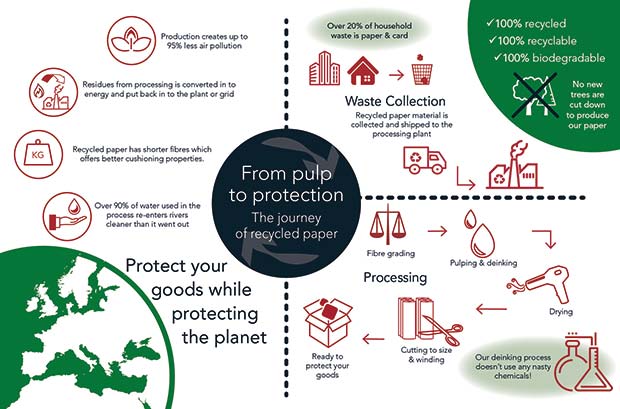We often boast that our paper products are 100% recycled, recyclable and biodegradable – but what does that actually mean? What’s all the fuss about? Many people think that using recycled materials is a PR exercise in that processing it uses as much energy as using a virgin product so what’s the point? In this piece we hope to shed some light on the journey our paper makes before it ends up protecting your goods.
 So, what is ‘recycled material’?
So, what is ‘recycled material’?
The recycled material that makes up most recycled paper products comes from pre or post-consumer waste, this includes trimmings and discarded paper from the manufacture of other paper goods, old corrugated boxes and curb-side collected waste.Did you know…? Over 20% of household waste is paper and card.
How does waste become paper?
After the waste is collected, it is taken to a processing plant where its’ journey begins.
The fibres are then graded for quality and moisture content. After grading, the fibres are run along conveyors which pulp the material with water and sodiumsilicate (the same chemical which is used for filtration in wine-making). This combination loosens the ink and cleans the fibres – this is a process known as screening.
Now the fibres are clean a wire rack presses and flattens them into an even sheet. The paper then runs through a machine at over 60 mph which gradually presses the water out of the pulp using a combination of a vacuum and centrifugal force to gently dry it. Any excess heat generated during this stage is retained within the plant for efficiency.
Once the paper has then been rolled onto spools, a finished roll can weigh around 40 tons. The plant will then rewind the paper to fit the client’s specific requirements.
What about the energy used?
The production of recycling paper creates around 95% less air pollution than processing virgin material and any residues remaining after production can then be converted, creating 30% thermal energy which then goes back in to the plant and the grid.
Not only does this mean that most of the energy used comes from the process itself but also the process actually gives back to the environment! The water taken from local sources for pulping is filtered before re-entering the source cleaner than when it was taken out, with over 90% ending up back in rivers.
What makes our paper white? Is it harmful to the environment?
Not at all. Our plants use hydrogen peroxide in their deinking process which is a much more stable and environmentally-friendly solution to the alternative chlorine or bleach options. The formula of peroxide is H2O2 which breaks down to harmless H2O and oxygen.
Not, only is it more environmentally friendly, this process creates higher yield with a more stable colour which is less likely to discolour over time.
Other than being kinder to the planet, what’s the point?
If the fact that using recycled materials is actively helping the environment and ensuring that forests aren’t unnecessarily destroyed, there are many other benefits to using recycled paper.
• It’s cheaper than ‘virgin’ or Kraft papers, which are more inefficient during manufacture.
• Recycled paper results in a shorter fibre which is less abrasive on both products and packers.
• These shorter fibres offer better cushioning properties with higher impact and recovery characteristics – making it perfect for protective packaging.
• The resulting paper is easier to mould around any product shape.
With sustainability being at the forefront of everyone’s minds, it is crucial to know where your materials are coming from and be conscious of the affects they may have on the environment, but we understand that you have to run a business as well. With more and more people making sure they take reusable shopping bags with them or even getting loose fruit and veg rather than pre-packed, why wouldn’t you bring that conscientious mindset to your business – especially if it means you get better value for money and a more efficient, cleaner and greener product?
Surely it’s a no brainer! To find out more about Pregis’ range of 100% recycled, 100% recyclable and 100% biodegradable Easypack paper packaging solutions and to find the right system for your business, visit www.pregiseu.com.




Comments are closed.